The Trump administration’s recent announcement to place most USAID employees on administrative leave, combined with a significant reduction in staff numbers, raises alarms about the future of U.S. international aid and its global implications.
USAID Faces Workforce Cuts Amid Trump Administration's Reduction Efforts

USAID Faces Workforce Cuts Amid Trump Administration's Reduction Efforts
Major downsizing at the U.S. Agency for International Development as nearly all employees are put on leave, with significant layoffs underway.
The Trump administration has announced that nearly all employees of the U.S. Agency for International Development (USAID) have been placed on administrative leave starting late Sunday night. This drastic measure comes as part of a broader strategy to reduce the agency's workforce, involving the layoff of approximately 2,000 employees. An email from the Office of the Administrator, obtained by CBS News, reveals that only “designated personnel” performing critical functions or holding leadership positions will remain at work, leaving many uncertain about their job status.
This move follows President Trump's earlier attempt to significantly downsize USAID, which faced a legal blockade from a federal judge who temporarily halted the proposed cuts. However, a ruling on Friday lifted that temporary measure, allowing the administration to proceed with its reduction strategy. The email sent to employees also indicated that USAID would assist overseas personnel with voluntary return travel amid these layoffs. Judge Carl Nichols dismissed arguments from affected employees seeking to retract the administration’s plans, underlining the ongoing challenges at USAID.
These sweeping layoffs align with Trump’s broader vision to restrain federal expenditures and reduce the number of federal employees, an initiative notably supported by his advisor Elon Musk. Aligned with Trump's "America First" doctrine, both figures have been critical of substantial foreign aid commitments. In a recent speech, Trump denounced USAID as a "left-wing scam," indicating intentions to abolish its operations.
In a stepping stone to achieving this, Customs and Border Patrol (CBP) is set to occupy USAID’s former building, further signifying the administration's pivot toward a stricter immigration enforcement stance. With USAID's workforce once numbering around 10,000 — predominantly in international roles — experts warn of widespread repercussions for global aid systems.
As programs across various countries face freezes due to these budget cuts, many fear that the U.S. is sending troubling signals, potentially undermining its reputation as a reliable partner in humanitarian efforts. Former USAID chief Gayle Smith emphasized the risk of such actions, pointing to the dire message of indifference they could relay globally. The implications of USAID’s funding halts affect at least fifty countries, raising significant concerns about public health and safety worldwide.
This move follows President Trump's earlier attempt to significantly downsize USAID, which faced a legal blockade from a federal judge who temporarily halted the proposed cuts. However, a ruling on Friday lifted that temporary measure, allowing the administration to proceed with its reduction strategy. The email sent to employees also indicated that USAID would assist overseas personnel with voluntary return travel amid these layoffs. Judge Carl Nichols dismissed arguments from affected employees seeking to retract the administration’s plans, underlining the ongoing challenges at USAID.
These sweeping layoffs align with Trump’s broader vision to restrain federal expenditures and reduce the number of federal employees, an initiative notably supported by his advisor Elon Musk. Aligned with Trump's "America First" doctrine, both figures have been critical of substantial foreign aid commitments. In a recent speech, Trump denounced USAID as a "left-wing scam," indicating intentions to abolish its operations.
In a stepping stone to achieving this, Customs and Border Patrol (CBP) is set to occupy USAID’s former building, further signifying the administration's pivot toward a stricter immigration enforcement stance. With USAID's workforce once numbering around 10,000 — predominantly in international roles — experts warn of widespread repercussions for global aid systems.
As programs across various countries face freezes due to these budget cuts, many fear that the U.S. is sending troubling signals, potentially undermining its reputation as a reliable partner in humanitarian efforts. Former USAID chief Gayle Smith emphasized the risk of such actions, pointing to the dire message of indifference they could relay globally. The implications of USAID’s funding halts affect at least fifty countries, raising significant concerns about public health and safety worldwide.





















